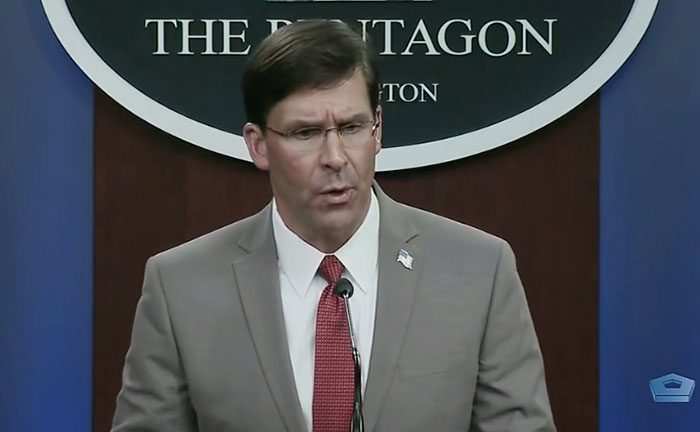Secretary of Defense Visits USAMRDC, Delivers COVID-19 Response Plan

U.S. Secretary of Defense Mark Esper delivered a series of key updates during a March 17 news conference from The Pentagon designed to update both the military and the public on the DOD's COVID-19 response effort.
"If we can dramatically reduce the spread of the virus over the next 15 days, then together we can help restore public health and the economy, and hasten a return to our normal way of life," said Esper.
Esper spoke following a mid-morning visit to the U.S. Army Medical Research and Development Command (USAMRDC) at Fort Detrick, Maryland, where he toured the U.S. Army Medical Research Institute of Infectious Diseases (USAMRIID) and spoke with senior leaders and scientists about the ongoing efforts to develop specific COVID-19 countermeasures. Following receipt of virus samples earlier this month, USAMRIID scientists have been working on both developing a vaccine for COVID-19 and, also, developing methods for validating COVID-19 testing kits, among other efforts. USAMRIID leadership has further been installed as a key member of a virus taskforce charged with providing updates to senior Army leadership on a daily basis.
"The chance to talk to the doctors face-to-face was really helpful to me in understanding what they're doing," said Esper on his meeting with USAMRIID personnel. "They've been very successful in the past whether it's dealing with Ebola or Zika [and] they have incredible capabilities."
Esper further used the news conference to outline several immediate steps the DOD is taking to support U.S. public health efforts in the wake of the pandemic. According to Esper, the DOD will provide five million respirator masks and two thousand deployable ventilators to the U.S. Department of Health and Human Services as part of the support effort. Further, the DOD will make several of its certified labs available for Coronavirus testing for both members of the military and the public in the coming days.
Overall, Esper stated it would likely take USAMRDC-affiliated labs between 12-18 months to develop a COVID-19 vaccine, though he did qualify that statement by touting USAMRDC's capabilities to assist in testing of potential similar vaccines should private industry partners reach that milestone first.
"The Army's work on a vaccine is one of the many ways the Department of Defense is supporting President Trump's 'whole of government' approach to fight the virus and to substantially slow its spread," said Esper.
 An official website of the United States government
An official website of the United States government
 ) or https:// means you've safely connected to the .mil website. Share sensitive information only on official, secure websites.
) or https:// means you've safely connected to the .mil website. Share sensitive information only on official, secure websites.


